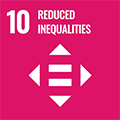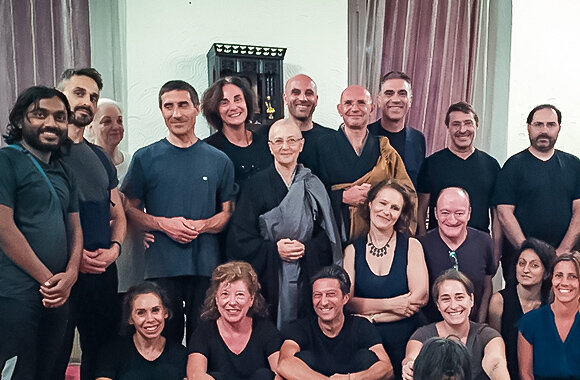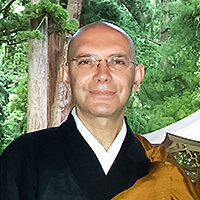Use of Cookies
Our website uses cookies to facilitate and improve your online experience.

Siddhartha Gautama, the future Buddha, was born in a social environment marked by strong and fierce discrimination: the caste system divided the society of the time into extremely separate social groups. Those who belonged to the lower classes were subject to inequality, prejudice and limitations. The Buddha strongly opposed this situation.
The Buddhist teaching based on non-self, interdependence and equanimity is a revolutionary event in the history of humanity. The doctrine of non-self teaches us that there is no separation between living beings. The founding moment of Buddhism itself, namely the Awakening of Shakyamuni, coincides with the realization of the absolute interdependence among all beings. I, together with all beings and the great earth, simultaneously achieve the Way"1 were his first words after Enlightenment. According to Buddhism, discrimination, prejudice, social injustice are therefore the result of blind ignorance of this Fundamental Law, a distorted vision based on ignorance, greed, fear.
Mahayana Buddhism, bringing forth the concept of Buddha Nature inherent in all living beings, cancels any division based on race, gender, culture. In the Indra’s Net, the Net of Interdependence, every existence is a precious pearl that reflects all the other pearls to which it is inextricably linked.
Today, after 2500 years, science and technology have made unimaginable progress, but the situation has not changed much since the time of the Buddha: discrimination and prejudice based on ethnicity, religion, culture, gender, economic and educational models, are still present at every level of our society and this leads to social inequality, restriction of personal freedom, lack of dignity.
One of the United Nations Sustainable Development Goals signed by Soto Shu Shumucho is to reduce social inequality. All of us Zen practitioners are called to do our part.
As followers of the Way of the Buddha it is our responsibility not to simply be silent observers of injustice and discrimination, but to be present to this reality with all of ourselves and try to give our best to overthrow and demolish all those mental and social institutions built on hatred, ignorance and greed.
The founder of Soto Zen, Dogen Zenji, although he was a monk born in Japan in 1200, spoke strongly against discrimination towards outcasts, women and other marginalized categories, going against the mental schemes that governed the system of his time. Still today, his considerations are powerful and relevant for us, his successors.
As pointed out by prof. Michiko Yusa: “Dōgen, thoroughly immersed in the spirit of Mahāyāna teaching, embraced the worldview that all beings are destined for Buddhahood—including plants and insects—the message proclaimed in the Lotus Sutra and other scriptures. As regards his position on the matter of gender, he was unequivocally egalitarian. At the start of his career as a zazen master, he was convinced that “male and female, the noble and the lowly—everyone can understand and embody the Buddha’s teaching.”(Bendowa) In his sermon “Raihai tokuzui” [“Rendering obeisance and thereby gaining the marrow of the teaching”], he famously declared:
“What is so precious about being born a male? Space is space; four elements are four elements; five skandhās are five skandhās; the distinction between men and women is also thus. Both genders attain awakening. What you should pay respect is to the person who attains awakening; whether this person is male or female is beside the point”.2

This went against that insidious misinterpretation of Buddhist teachings according to which those who suffer from injustice and discrimination pay the result of their bad Karma, as if it were a sentence to be served, and therefore do not deserve support and help.
Dogen, with his life and his teaching, has emphasized a path that lets go of self-affirmation, of attitudes based on the achievement of fame and personal profit, and thus makes possible the flow of a spiritual communion with all beings, sentient and not. A vision in stark contrast to the currently prevailing ideology of the exploitation of natural and human resources that abuses and consumes people and things, generating inequity and lack of consideration.
On a personal level, the interconnection that binds all living beings should lead us to understand that sometimes the maintenance of our own privilege is the cause of an injustice or an inequality suffered by someone else.
Sometimes I wonder: How attached am I to my personal privileges, as a male, white, upper-middle class, educated person, living in an economically prosperous country? Am I willing to let them go in order to listen to the needs of the other with an open heart? Opening our hearts to the truth of the Dharma and letting go of attachment to our privileges is certainly the practice of renunciation, but it is not a sacrifice: it is letting compassion flow freely, without the obstacles produced by a vision clouded by the poisons of aversion, ignorance and attachment.
To think, however, that reducing inequalities means making sure that everyone can have more money to consume more, means perpetrating a vision based on the frantic search for profit, a vision that has brought the planet almost to the brink of extinction. Buddhism teaches us that it is not necessary to have a lot of money to live happily: much more important is to provide what is necessary to develop with dignity the richness of human nature that is expressed in different cultures, arts, religions.
Reducing inequalities does not mean canceling diversity in order to homologate everything to a single model of social development. It is necessary to learn to enhance diversity and to ensure that every human activity, as a manifestation of the dynamics of the universe (what Dogen Zenji calls zenki: Total Function), has the same opportunities to express itself and pursue its goals, each according to its own modalities and characteristics, in its own natural and cultural environment.
Rev. Uchiyama Kosho Roshi used to say: “giving expression to life means that a violet blooms as a violet and a rose as a rose . (…). What is vital here is that you give expression to the flower of your Self, the flower of here and now, and allow it to blossom as completely and as naturally as it can in every moment of your life. That flower of your Self, that flower of here and now, is your life!”3
This is the richness and beauty of life and this is what we can give with our practice to the countless living beings that we have made the vow to free.

Notes:

The abbot and resident teacher of the Anshin Zen Center in Rome, Italy. He received Dharma Transmission in 2015 from Rev Shohaku Okumura. He has been Kokusai Fukyoshi since 2016. He has a university degree in Humanities and Anthropology.